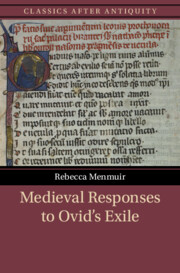Book contents
- Medieval Responses to Ovid’s Exile
- Classics after Antiquity
- Medieval Responses to Ovid’s Exile
- Copyright page
- Contents
- Acknowledgements
- Quotations, Translations and Transcriptions
- Abbreviations and Conventions
- Introduction
- Part I Responding to Exile
- Part II Becoming the Exile
- References
- Index of Manuscripts
- General Index
Introduction
Published online by Cambridge University Press: 27 May 2025
- Medieval Responses to Ovid’s Exile
- Classics after Antiquity
- Medieval Responses to Ovid’s Exile
- Copyright page
- Contents
- Acknowledgements
- Quotations, Translations and Transcriptions
- Abbreviations and Conventions
- Introduction
- Part I Responding to Exile
- Part II Becoming the Exile
- References
- Index of Manuscripts
- General Index
Summary
The Introduction establishes the primary arguments and scope of the book. It defines ‘Ovidian exile’ in two related ways: firstly, as the poetry written by Ovid in exile, namely the Tristia, Epistulae ex Ponto and Ibis; and secondly, as Ovid himself as the figure of the exiled poet. Ovidian exile in these terms had a vast influence across medieval culture, informing teaching, preaching, reading and writing – among a host of activities Menmuir terms ‘responses’ – in the later Middle Ages, offering a mode of voicing exile, marginalisation and poethood itself. After describing the circumstances of Ovid’s exile and the primary concerns of the exile poetry, Menmuir introduces the Ovid, or Ovids, of the Middle Ages, including the common perception of Ovid as the tripartite mythographer, lover and exile. Ovid and his works were deemed ethical, and even Christian, in medieval exegesis: the fact of his exile created a penitential arc which enabled Ovid’s transformation into Ovidius ethicus. Menmuir defines ‘responses and respondents’, where ‘response’ comprises a more active expression of ‘reception’. The book’s scope primarily includes responses between the twelfth and the fifteenth centuries and focuses on England, albeit as linked to the continent in several ways.
Information
- Type
- Chapter
- Information
- Medieval Responses to Ovid's Exile , pp. 1 - 26Publisher: Cambridge University PressPrint publication year: 2025
